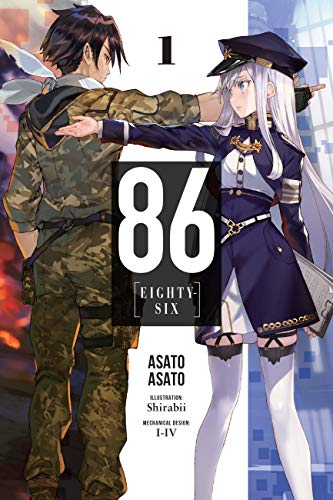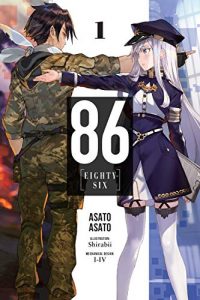By Asato Asato and Shirabii. Released in Japan by Dengeki Bunko. Released in North America by Yen On. Translated by Roman Lempert.
Fans of Lena, the star of Vol. 1 of this series, may be disappointed, as this is not a sequel to the previous book but an interquel – it explains what happened to the rest of the squad between when she last saw them and the epilogue, and thus Lena only appears at the start and end in a “she’s still in the Republic” sort of way. That said, this is still a very good volume of Eighty-Six, combining the mechs and battle scenes with more look at warfare, what makes us fight, and how even well-meaning people can try to impose their own wishes on others. It’s not as unrelentingly bleak as the first book, but it’s not a laugh riot, either – Eighty-Six will always be about as serious as its male lead, Shin, who may be with a different army but still has some of the same problems. And then there’s the Legion, the enemy soldiers whose attack near the end of the book feels like they’re trying to cause our heroes to simply give up in despair. There’s a lot of them. (Well, they are Legion, after all.)
The girl on the front is Frederica, who is a “mascot” for Shin’s unit, the Federation Army’s way of getting troops to bond with each other by giving them an adorable kid to look after. It’s not clear if this is actually true or not – Frederica’s the only one we see, and her situation is certainly one where a great cover story would be needed – but in any case, she fulfills some of the role Lena did in Vol. 1, attempting to get the other Eighty-Six to think about something besides fighting until they inevitably die. At least she’s just trying to get them to consider it, though – their main benefactor, Ernst, after rescuing them from certain death, is ready to have them retire and become good little civilian boys and girls, and is appalled when they all, to a man, decide to re-enlist. The trouble is that not only have this group been soldiers so long that anything else seems deeply off, but they know the Legion better than anyone else, and won’t allow others to take up that fight.
The Federation is better than the Republic in many ways, so there’s less explicit racism here towards the Eighty-Six, but that does tend to mean that it’s implicit. The soldiers are unnerved at both the Eighty-Six’s combat prowess (particularly Shin) and their stoic demeanor, and use the word “Eighty-Six as a slur several times throughout the book. “Monster” also comes up, and it’s clearly a point of tension that the Eighty-Six could have chosen to retire and never fight again. That they’d fought enough. But is it enough? The Legion are attacking in greater and greater waves. Where do you draw a line that says “that’s fine, you can leave it to everyone else now”? Especially if you’re Shin, with his seemingly psychic connection to the Legion.
This series continues to be what it was in the first book – unrelentingly grim but not despairing, and making me want to read more even if it is depressing much of the time. As you can tell by the subtitle, this is the first of a two-parter, and I suspect by the end of Book 3 we’ll be back to where we were with Lena reuniting with everyone.



